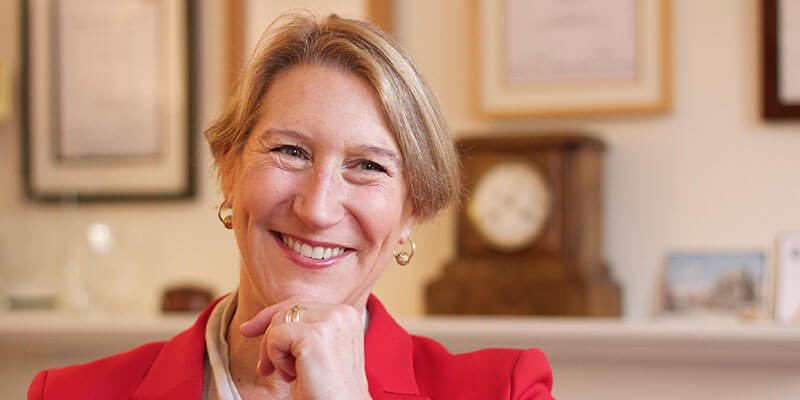Speaking to judge and Advisory Board member Allyson Stewart-Allen
29 June 2020
Allyson Stewart-Allen is a Lloyds Bank National Business Awards stalwart. Originally from California, Allyson has made her name in the United Kingdom as an educator, advisor, author, speaker and non-executive director, as well as a judge and Advisory Board member with the Awards. We spoke to her about her role with the Awards and what she expects to see this year.
You’ve been involved with the Lloyds Bank National Business Awards for several years now. What is it about the Awards that’s has kept you enthused?
I learn a lot. I learn about how amazingly innovative the UK is in terms of its companies, tech, intellectual property. The productivity and intellectual property output in particular is off the charts—it’s remarkable for a country of 60 million.
It’s been fantastic finding these new companies and new business leaders of all sizes—I’ve learned a lot about good leadership from the Awards.
I think recognising companies is the right thing to do. It encourages others to enter, and it gives them a chance to pause and reflect as a company, not just when you win but even when you apply, on why you rightly deserve some recognition for what your business has achieved. The UK business culture needs a lot more of that.
On that note, as an American in the UK, is there anything unique you’ve noticed about the UK business community in your years judging the awards?
Modesty. It’s nice that people aren’t generally cocky and arrogant!
But in the 31 years I’ve lived in the UK, companies have become prouder, and there’s less of a stigma about talking about success, which there definitely used to be. The humblebrag is very much a British phenomenon.
I don’t think this is a problem, but when succeeding is somewhere like the United States, for example, UK businesses need to learn to be louder and more bullish.
They have a lot to be proud of. If you think about the contribution British businesses make to the world, it’s pretty outstanding. Even now, we might be on the verge of a British vaccine for COVID-19: the team in Oxford that identified Dexamethasone—the steroid that reduces death in ventilated COVID-19 patients by one third—is making great strides towards one.
Then you look at fintech, life sciences… I think the awards are absolutely the right way to give these companies recognition.
As both a judge and member of the Advisory Board, how do you think the Lloyds Bank National Business Awards has changed since you began your involvement?
They’ve grown! The recognition that these are the only real national awards has developed over the last six or seven years since I’ve been involved, and I’ve seen the number of applicants and the interest from sponsors grow significantly alongside it. Its magnetism has heightened a lot, which is a great thing to see.
As a judge of the Exporter of the Year Award, have your expectations changed given the disruptions this year?
No, they haven’t. COVID hasn’t stopped all business, so in some ways this will test which companies have sustained their international expansion despite it, by adopting a virtual way of doing business and of negotiating across cultures and boundaries.
With that in mind, what kind of firms do you want to see enter your category?
I think more of the same. The calibre of the companies that I’ve seen over the years has been getting better: they’re more intentional, they’re more quantitative, they’re more methodical, and they have good leadership. They’re not successful by accident. There are always opportunists but they’re few and far between; instead we’re continuing to see companies that have a plan and have stuck to it despite market forces and pandemics.
This year, it’s going to be a really interesting test of resilience and creativity. These qualities are sorely needed in the face of what we’re experiencing.
With just a few days left to enter, how would you distil your key advice for firms still thinking of entering?
Less is more: we don’t necessarily need the full chronology of your business. A good indicator is staying power, being able to manoeuvre in the light of significant challenges—even those that existed pre-COVID.
In every industry you have dropouts that can’t make it, so you need to tell a really sharp story about what your company’s success, and how and why it got there. Some companies can’t articulate the how and why, or they attribute it to spurious factors, so understanding that “how” and “why” is critical.
You need a crisp story about why you exist, who you serve, what makes you different and what you’re doing to protect what makes you different—that’s what makes you worthy of an award.

